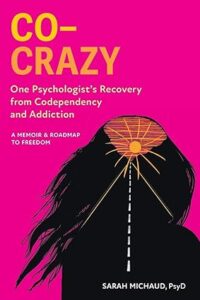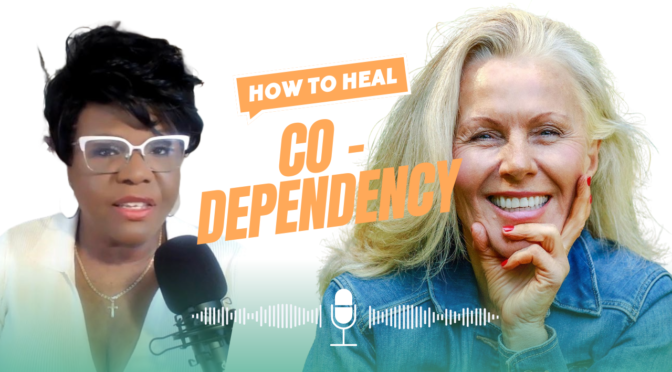Dr. Sarah Michaud joins the Author's Corner to discuss her book, “Co-Crazy,” and offers insights on overcoming codependency relationships and addiction. Michaud shares her personal journey and provides practical advice on setting boundaries, addressing denial, and focusing on self-care to aid recovery from addictive relationships. Highlighting the importance of confronting one's own needs and fears, she emphasizes how to regain control and achieve personal freedom. Tune in for an enlightening conversation on navigating relationships with addicts and reclaiming your mental health. For more, visit Dr. Michaud's YouTube channel “Leaving Crazy Town” and her articles on The Sober Curator.
Download the Podcast Here:
Key Takeaways:
-
Codependency not only affects those in relationships with addicts but extends to many interpersonal dynamics where self-worth is determined by others.
-
Focusing on oneself rather than trying to control or change the addict or partner often leads to better outcomes.
-
The first tool to combat codependency is understanding and addressing one's own needs and self-care.
Understanding Codependency: Beyond Addiction
“Most especially women can be codependent, which is really putting other people before you basically—you're deciding who you are by how the world responds to you.”
Dr. Michaud highlights a vital clarification about codependency—a term initially coined within the context of relationships involving substance abuse. The term ‘codependency' has evolved, and it now encompasses a broader range of behaviors where one's self-worth and decisions hinge on external validation.
-
Broader Implications: The dependency often transcends beyond addiction. Dr. Michaud specifies, “Whether they have a substance abuse problem or not, partners want to change each other.” It's a ubiquitous issue where individuals lose their identity trying to mold others.
-
Personal Accounts and Expertise: Drawing from her experience and countless sessions with patients, Dr. Michaud illustrates that many individuals—primarily women—navigate life with a peripheral focus, sidelining their desires and needs. This dynamic is pervasive, affecting not just romantic relationships but also parent-child relationships.
The fundamental takeaway here is the poignant realization: codependency isn't merely about substance abuse. It’s about relinquishing control over one's life, thoughts, and emotions to others’ reactions and behaviors.
Paid Link

The Counterintuitive Path to Recovery From Codependency : Focus on Yourself
“People aren't going to like my advice… The more you focus on the addict, the worse it's going to get. What needs to happen is you need to change the focus to yourself.”
This groundbreaking advice may clash with conventional wisdom. Dr. Michaud asserts that redirecting attention from the addict to oneself is crucial for both personal recovery and influencing the addict's behavior.
-
Set Boundaries and Limits: By establishing firm boundaries and focusing on one's well-being, one inadvertently influences the addict's journey toward recovery. Dr. Michaud gives a potent example: “If I say, ‘Honey, I love you, but I can't continue to live with this addiction unless you go to treatment,' that’s about me, and it’s setting a boundary.”
-
Avoiding Resentment: This approach also minimizes resentment. Instead of blaming or trying to control, which often backfires, expressing personal feelings and needs garners more respect and understanding: “It's about owning my stuff and the other person can really hear it,” Michaud emphasizes.
This profound shift from external to internal focus not only empowers the individual but also paves the way for healthier interpersonal dynamics.
Paid link

The Role of Self-Care: Rebuilding from Within
“The first tool in the book is to look at yourself and to try to take care of yourself a little bit and step away.”
Dr. Sarah Michaud's book, “CoCrazy,” underscores the indispensable role of self-care in breaking free from the chains of codependency. Achieving mental and emotional stability often requires redirecting the energy spent on others back to oneself.
-
Identifying Personal Needs: Michaud explains, “If you do that enough over a long enough period of time, you're going to lose yourself.” Re-engaging with personal needs and desires is monumental in reclaiming one's identity.
-
Practical Steps: The book provides concrete strategies for those in the throes of codependency—ranging from professional guidance to everyday self-care routines. This includes setting personal goals, seeking therapeutic support, and fostering hobbies and interests that nurture self-worth.
This approach not only alleviates the mental anguish tied to codependent behaviors but also fosters a more balanced and fulfilling life.

Summarizing the Narrative: The Journey to Freedom
Interweaving personal anecdotes, professional expertise, and actionable steps, this dialogue with Dr. Sarah Michaud serves as a critical guidepost for anyone ensnared in the web of codependency. The core message resonates with authenticity and practical wisdom—realigning focus from external tumult to internal harmony is the linchpin for liberation.
To encapsulate:
-
Redefining Codependency: Understanding the term's evolution and its wide-reaching impact beyond substance abuse.
-
Transformative Recovery Approach: Emphasizing self-focus over attempting to control others as a more effective recovery strategy.
-
Self-Care as a Pillar: Implementing self-care and setting boundaries as foundational steps to reclaiming one's life from codependency.

Conclusion
These insights, rooted in Dr. Michaud’s deep expertise and lived experience, provide a roadmap to not only navigate but also transcend the challenges posed by codependency and addiction. By steering the journey towards self-awareness and self-care, individuals can reclaim their autonomy and carve out a path of personal and relational fulfillment.
Resources:
-
Dr. Sarah Michaud's website: drsarahmichaud.com
-
YouTube Channel: Leaving Crazy Town
-
The Sober Curator: The Sober Curator
-
Book on Amazon: CoCrazy: One Psychologist's Recovery from Codependency and Addiction – A Memoir and Roadmap to Freedom







